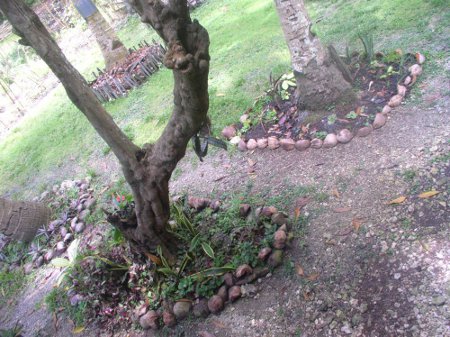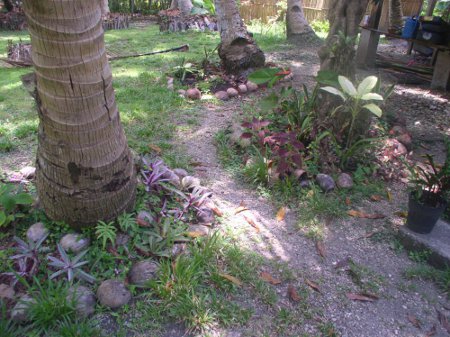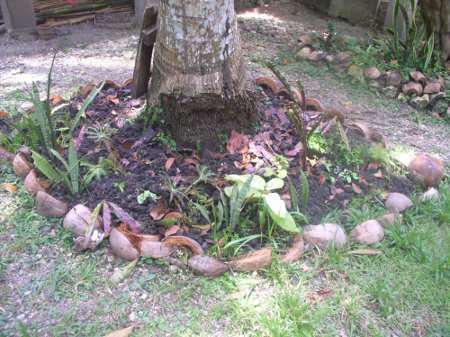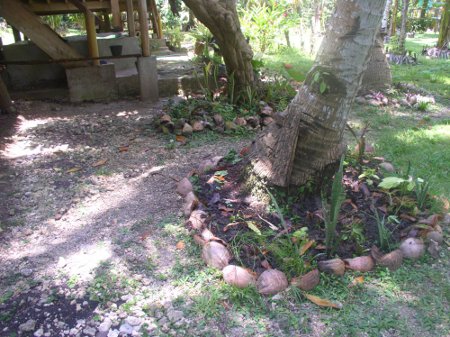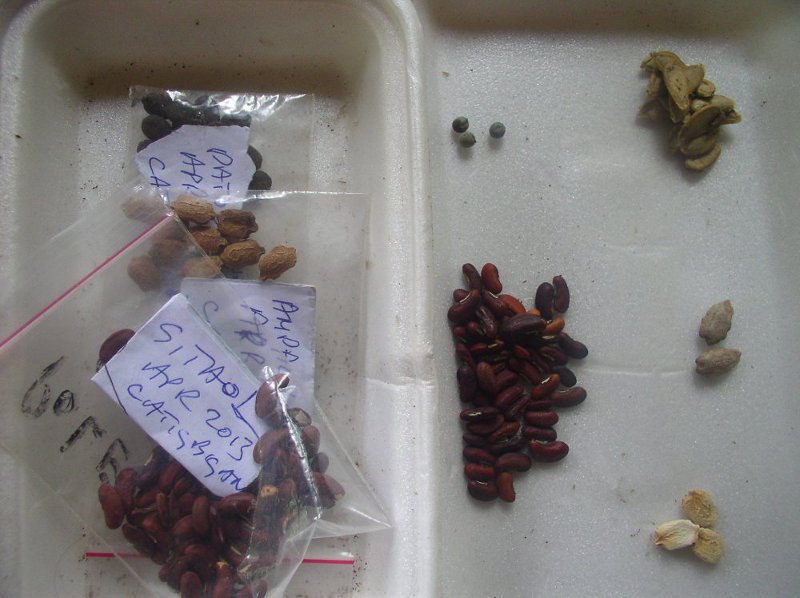Tropical Heritage Garden Diary:
April 2013:
2 April:
Black
Seeded Sesame, Miriah Amaranth, Aswad Eggplant, Pasilla Bajio
hot pepper, Red Marconi sweet pepper, Red Creole Onion and Tokyo
Long White Bunching Onion planted in paper pots. To test
germination and aid recognition.
Paper pots were three-quarters filled with mixture of damp earth
and coconut chippings. An inch thick layer of coconut chippings
was then added. The Sesame seeds were planted under the coconut
layer -but the other seeds were surface sown, on top of the
chippings. Then pushed slightly under -to cover them from passing
birds. The pots were put inside coconut shells and placed on the "Pechay station".
5 April:
Lots of rain in the night -so a
good day for planting with temperatures around 30 degrees
centigrade.
Some of the squash look as if they are already forming flower buds
-but which ones? In order to find out -planted 2 seeds of each
type (Lemon Squash,
Zucchini-Gray, White Bush Marrow and Seminole Pumpkin) again -with
labels: One each, in the original squash patch and the rest in
various empty locations amongst the kangkong.
Some seeds from a market
bought Squash were also planted in various locations
scattered around the garden.
Supermarket bought (Chinese)
Patola (luffa gourd), Upo (bottle gourd) and Ampalya (bitter gourd) were
planted along the chicken fence -and in various small hills -with
each other -or mixed in with other climbing plants.
Peanuts were planted (as
soil improver) in the Ginger
bed, around Banana trees
and in a few vegetable beds.
Supermarket bought (Chinese) Eggplant
was mixed with mud (to protect
it from the chickens) and thrown down in the open areas
near where the winged beans are growing. This was to see if the Eggplant would be able to
germinate in an area already populated with (short) weeds.
Banana seeds are a rarity
-but a few days ago we bought a bunch of red bananas that had a
lot of fairly well grown seeds inside. Some of these were planted
in a pot.
Persimmon, Atis and Rambutan
-all given to us in November while visiting Fatima's mother (who had saved them during the
previous year) -were also planted in pots. A previous
attempt to get them to germinate failed, but maybe (the warmer)
weather conditions are now better.
Finally, a small Grapefruit,
grown from seed in a pot (this year) was planted down where the
ruined section of the main gate has been turned into a fence (and
already planted with San
Francisco by Terri).
6 April:
In the morning, after watering the
vegetable seedlings, two young Lanzones
seedlings were planted near the side gate. They'd been grown in a
pot (this year) from
locally bought fruit. Also planted some Honeysuckle down by the new fence made from the
old main gate. The Honeysuckle
plants were cuttings from a plant bought in Manila, just before we
moved here, which has now grown quite large along the fence near a
neighbouring house.
In the afternoon, worked on building a small garden around one of
the coconut trees. Several plant cuttings growing extensively in
pots were split up -and either re-potted or planted in the
new area -adding to the Oregano
and Tiger Tails already
growing there. Because the ground was exceptionally hard and stony
around the tree (which was near the house and close to where
people often walk) extra soil was collected from the lower garden
and mixed with chopped coconut fiber. The plants were then planted
in shallow cavities dug in the stony ground and the new soil
spread around them (covering the roots) to give both nourishment
and support.
In the late afternoon, we chased the chickens away from the area
where I'd sown Eggplant yesterday. We wonder how many
are left. They are rather vulnerable -because it can take several
weeks for them to germinate. The chickens are a nasty complicating
factor -because I'm curious about the capability of crop seeds
breaking through a cover of weeds. Today, some chickens were even
inside the netted areas. Presumably they had flown in over the
netting -so more cross-struts (or extra netting) may be required
to prevent them.
7 April:
Something, presumably a lizard, has
been eating the
Banana seeds
that were kept on the balcony for drying (
the first batch had been planted two days ago while
still fresh). The seeds were looking pretty dry already,
so I decided to soak them for a while and then sow them in a
freshly prepared pot of soil mixed with coconut chippings. The
seeds were laid on top of soil, covered with a layer of chippings,
and put out with the other pots to germinate.
Work also continued on the new
"garden" under the
Coconut tree.
Peanuts and
Mung Bean were planted as
basic soil improvers. Four
decorative
(but edible) Chili
seedlings
(planted in coconut
shells by Terri and placed on the "pechay station") were
added -plus a few cuttings from the
(pinky violet) flowering edible greens Terri also planted in the
(non-heritage) vegetable garden. Finally, a few of the (heritage)
Amaranth seeds were
scattered (mixed with soil and ash) on an empty area where
some fine potting soil had been dumped.
New Garden:
Old
and New: from above -and from a different perspective (below)
Two
Close-ups: Note stony soil which needs improving to nourish
trees
Planting needs to allow climbing
of the trees for harvesting
A few early (Eggplant, Amaranth,
Sesame and white
bunching Onion) shoots from the April 2 planting (in paper pots) are visible.
It is very warm, but water pressure is very low today -so one
cannot use the hose. Recently planted seeds need to be watered
with the watering can -but the rest will just have to develop deep
roots!
9 April:
Local (Non commercial)
Heritage seeds from Catigbigan
Busy sorting, labeling and bagging
local heritage seeds our helper Penny brought back from her
weekend visit to her ancestral home in Catigbigan. Two reletives (Naning and Jose) have given Malungguy, Papaya, Okra, Squash,
Sitau (both sources). Ampalya
(both sources), Snake
Bean and Patola
-plus Purple Ginger and a
few decorative foliage
cuttings.
A few Patola seeds were
planted (again) along the chicken fence, where two Patola are already growing
(but not flowering yet). Plants in this area are still struglling
to grow.
Most of the Okra had been soaking all night. These were planted in
the two areas next to where the Winged
Beans are fruiting. In one of these areas there are a
also few Eggplants struggling
to flower (near the Allubati)
-here I'd also planted new (Chinese)
Eggplant and Mung Beans, but it is possible
that the chickens have eaten most of them.
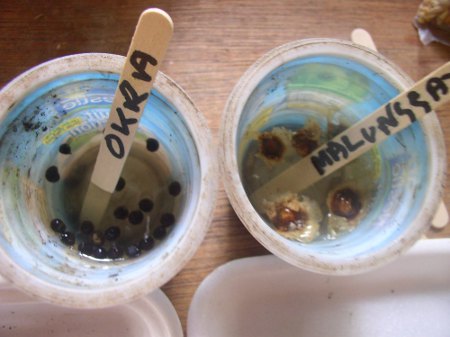
Some of the new Papaya
from Catigbigan were
soaked before being planted in a pot -and some were potted without
soaking first. Both were labeled -so one can see the effect (if
any) of soaking. Some Malungguy
seeds were also soaked and potted.
No water all day. Only in the late afternnon could we finally
water the garden. Managed the
"Southern" garden but was just starting on the "Northern" garden -when rain
forced me to abandon the attempt!
10 April:
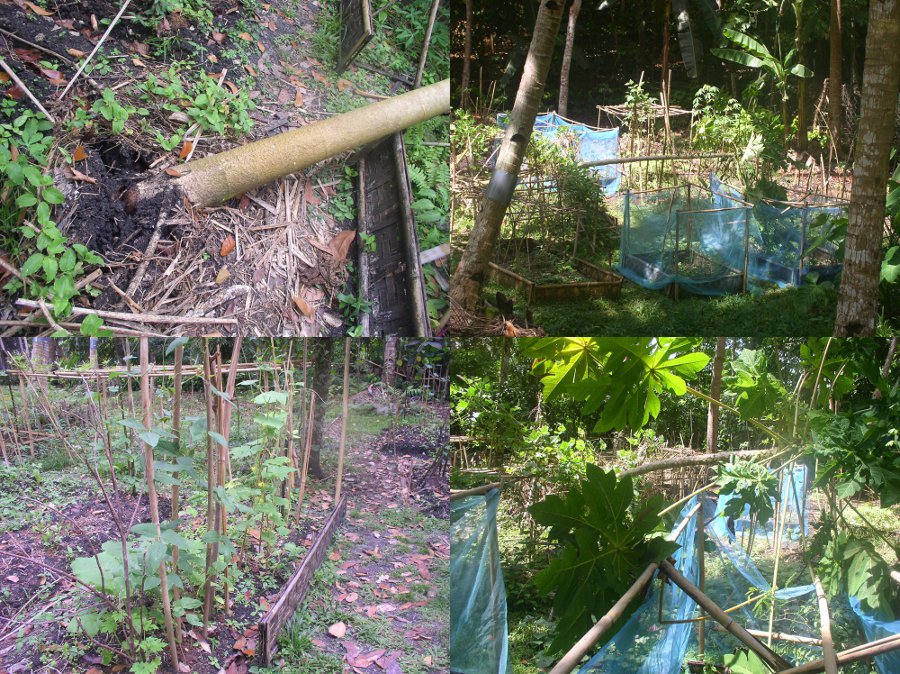
Success and Disaster!
Growing Heritage plants and
Fallen Papyaya Tree
11 April:
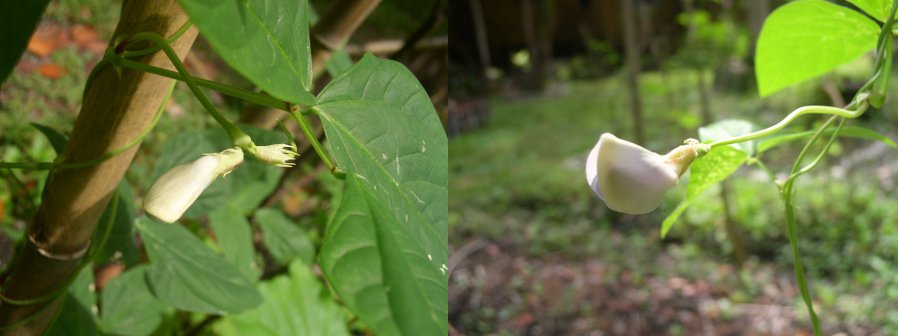
Red Seeded Asparagus Bean flower and Thai Purple
Podded Long Bean flower
12 April:
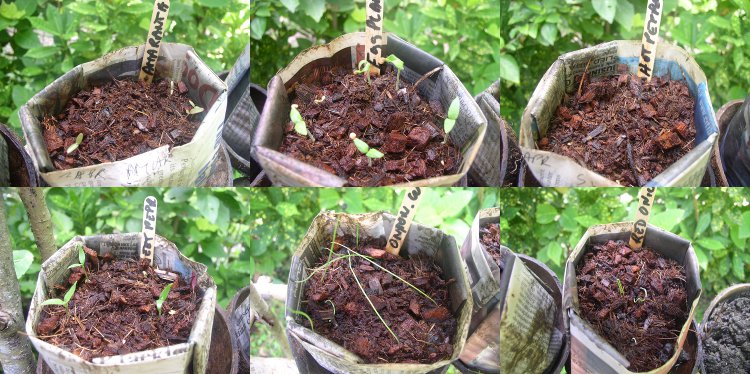
Sprouting seedlings -Planted on April 2
14 April:
Still
little sign of activity from the Sesame seeds in the paper pots. So made a
second attempt today. This time planting six seeds on the
surface of the coconut chippings. The Hot Peppers look as if
they might be starting to sprout.
The Purple Thai Beans
and the Asparagus Beans
seem to be maturing nicely. We should be able to pick some
soon.
For the second day it is very warm and not enough water
pressure in the taps to use the hose in the garden. Have
managed to fill a watering can a few times and water a few
seedlings in immenent danger. The rest will have to do the
best they can.
Until it rains, there is little to be done in the garden,
except watering, if possible.
15 April:

Red Seeded Asparagus Beans
and Thai Purple Podded Long Beans
-almost ready for
picking
16
April:
Today we hear that the
mayor has asked people to conserve water as much
as possible -because of el Nino and it is not known
how long the hot summer without rain will last.
Already, the last few days have been difficult because
the water pressure in the tap has often been too low
during the day to water the garden. We have often had
to wait until quite late in the evening before being
able to shower. A difficult time for both plants and
humans.
19
April:
A few days ago we
picked our first Red
Seeded Asparagus Beans and Thai Purple Podded Long
Beans. Good taste and nice and crunchy.
Unfortunately, they were also being attacked by
caterpillars. Today, I noticed the caterpillars were
being dealt with by red ants.
The drought continues. Some plants are starting to
wilt. However the Cucumber
seem to be doing very well.Climbing high and starting
to produce fruit -although there seem to be many more
male flowers than female.
21
April:
Luckily we had several
hours of sustained moderate rain in the night -so the
garden is recovering.
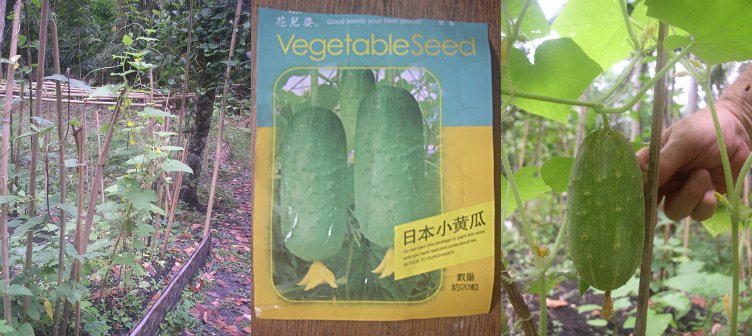
\
japanese
Cucumber (Cucumis sativus Linn)
--------------------------------------------------
Botanical
name: Cucumis sativus Linn.
Family name:Cucurbitaceae
Common name: Cucumber, Gherkin
2n number: 14
Orgin: India
|
Genus: |
|
A genus of annual or
perennial herbaceous plant having trailing
or climbing habit distributed in the
tropics and subtropics of the world. They
are cultivated for their edible fruits.
Leaves alternate, rough, pubescent;
flowers monoecious, yellow, solitary,
fruits pepo fleshy many seeded. Some
species are medicinal and also cultivated
in kitchen garden.
|
|
Species: |
|
An annual trailing plant,
originating from India. The leaves have
shallow pointed lobes. The plant bears
yellow, funnel shaped flowers and
green-skinned fleshy fruit with white
flesh. The fruits are eaten with flesh
when immature. It is also used as salads.
|
|
Occurences : |
Sub-tropical and tropical
parts of the world.
|
--------------------------------------------------
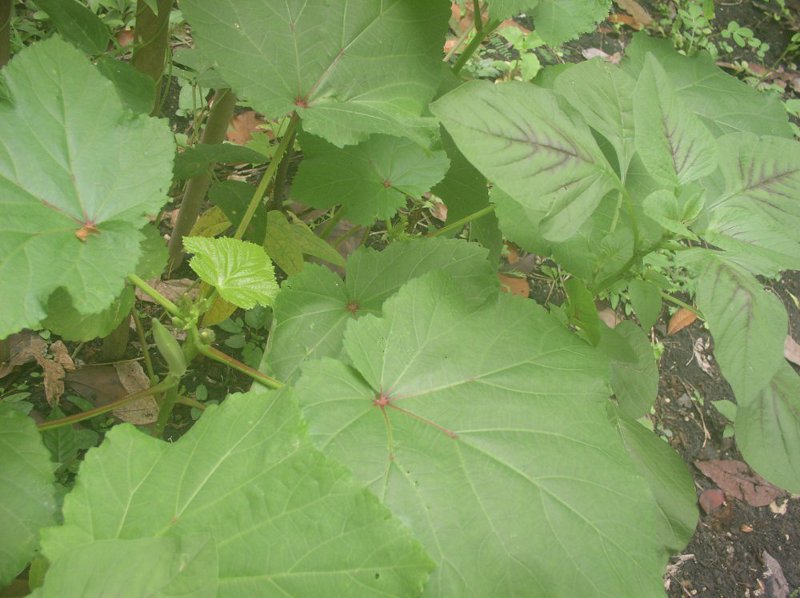
Budding Okra
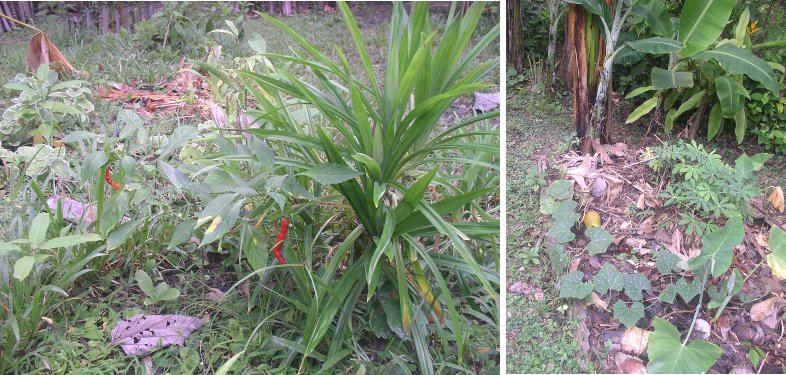
Hot pepper with
Pandan
Squash,
Taro and Cassava on Compost heap
Growing Wild
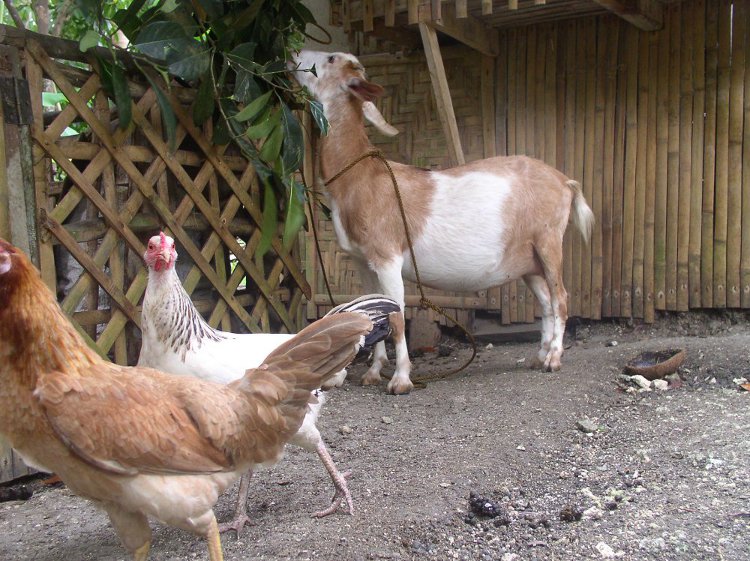
Our Tree Trimming and Insect Control
Team!
22 April:
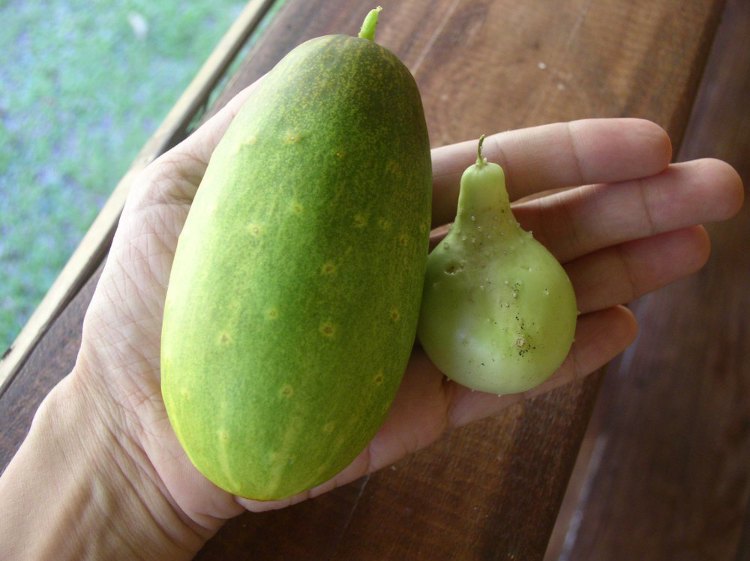
Two (different) Cucumbers
24 April:
A baby
goat born in the night -and a sprinkling of rain in the
afternoon: What a lovely day!
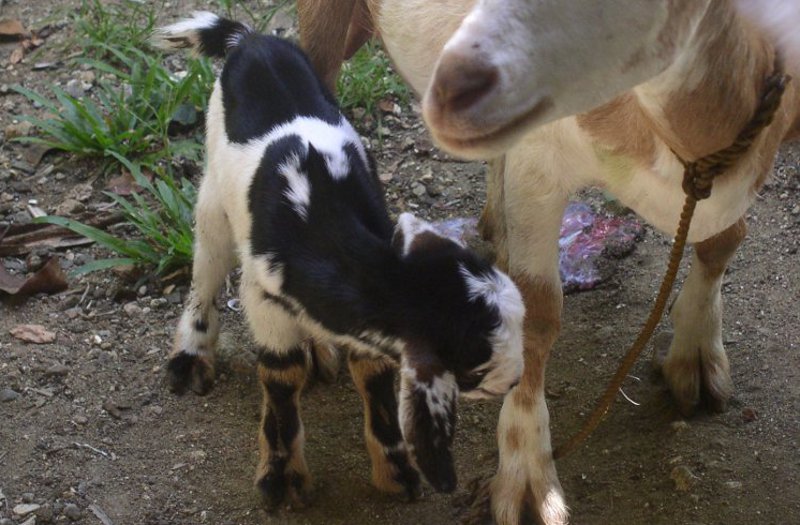 It's A Girl!
(we think)
It's A Girl!
(we think)
25 April:
No rain today (by 4:30 PM) and not
enough water in tap to use the hose.
Nevertheless, sowed Wansoy
(Coriander), Kinchay from
Ramgo and Italian Parsley from Yates, in a mixture of soil
and coconut covered with a layer of coconut chippings -in a half
coconut -and put on the "pechay
station" with the other seedlings.
The new kid has been sleeping most of the day -and may be having
problems with the heat.
30 April:
A small amount of rain in the
night, but not enough to really wet the earth.
No sign of germination by the
Wansoy , Kinchay or
the Italian Parsley (Sowed 25 April). So moved
them all to a cooler place next to the Tilapia pond.
Cracked
Earth
Flowering Bean
Lonely Luffa Flower
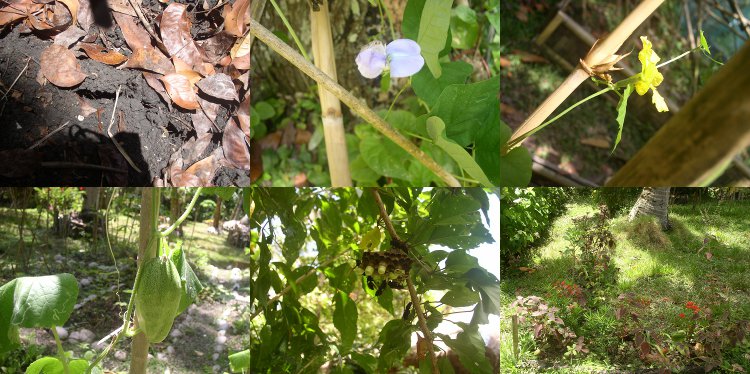 New Cucumber
Hornets Nest
Mixed Border
New Cucumber
Hornets Nest
Mixed Border
Surviving Disaster
Trevor Batten
<trevor at
tebatt dot net>
Baclayon 2013
home
